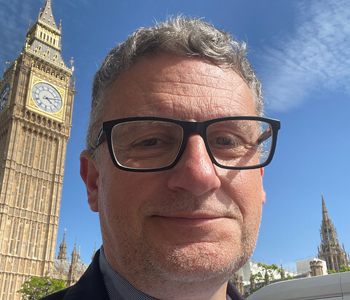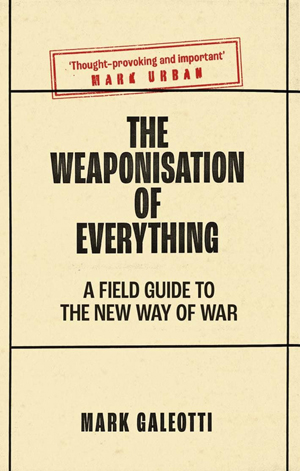
Even as shooting wars are raging in Ukraine, Gaza and Yemen, and may yet be sparked over Taiwan, there is much talk about the ways in which modern states face more subtle threats, from disinformation, subversion, economic pressure and espionage. This is the world of ‘hybrid war’, of grey zone warfare.’
The fact of the matter is that traditional conflict—fought with guns, bombs, and drones—is often becoming almost too expensive to wage, too unpopular at home, and too difficult to manage. Just ask Vladimir Putin, now two years and hundreds of thousands of casualties into a ‘special military operation’ that was meant to take no more than days or weeks and involve near enough no fighting. It is slowly bankrupting Russia, while Ukraine can only survive thanks to more than $3 billion in military and financial aid from the West every month.
Wars between states are, mercifully, becoming less common. However, conflict, rivalries between states over resources, trade access, technology and even ideologies are not disappearing—instead, they are taking new forms. In an age when the United States can and does threaten Europe with sanctions, when China spends billions buying influence abroad, and when Russia uses propaganda to try and rip democracies apart, these are the new kinds of wars.
The implication is that the world is heading for a new era of permanent low-level conflict, often unnoticed, undeclared, and unending. Conflicts can take place not just between avowed enemies, but also notional allies, and which are fought through international law, cultural assimilation and influence as much as the traditional means of assassination, espionage and subversion.
Two aspects of my professional path led me to this book. I have been working on security studies, with a particular focus on Russia since before Russia was an independent state, in the days when the perceived threat came not from election interference or espionage so much as the Red Army rolling into western Europe. Over time, our whole notion of ‘security studies’ changed, and I changed with it, as the threat became more about banks than tanks, thugs than MiGs.
In that context, I also have a specific interest in Russian organised crime (which led to my 2018 book The Vory: Russia’s Super Mafia, and in particular its relationship with the Kremlin. Under Putin, we have seen the Russian state increasingly using organised crime as an instrument of statecraft, for everything from sanctions-busting to assassinations abroad. That got me thinking of the new ways nations can ‘fight’ and the new ‘soldiers’ they can use in the modern age, ones to which we often fail to pay enough attention.
After all, modern transnational organised crime, taking fullest advantages of the weaknesses in the modern world order, is a perfect example of the dark side of globalisation, something at the heart of this book. It was hoped that the more we are connected, the less likely wars will be, and to a degree that is true: now, we can easily find that potential enemies are also the people from whom we buy food or sell cars, take loans or license technology. The flipside, though, is that we become more vulnerable because of this interconnectedness. The war in Ukraine caused hunger in sub-Saharan Africa; a Chinese invasion of Taiwan would mean a crisis in the global microchip industry; a hacker in Argentina can collapse a bank in Zimbabwe. As a result, countries are both so much more vulnerable to interference from afar, but also have many more opportunities to interfere themselves.
After all, there is nothing new in the reality of countries meddling in, undermining and subverting others, and doing so often covertly. A recurring theme of the book is drawing on examples from the Renaissance, when European nations were beginning to be bound together more tightly by bonds of faith, finance and ideas.
What has changed is just how many things can be weaponised, and how quickly and easily. Thanks to cheap and easy air travel, for example, in 2021 Belarus could recruit would-be migrants from the Middle East eager to find new lives inside the European Union and try to force them across Poland’s border. Likewise, where once disinformation operations might have taken months or years to set up, with fake newspapers established and documents forged, now thanks to the internet they can be launched in hours or days.
At the start of each chapter is a scenario illustrating the themes it is addressing, and while the first is a speculative near-future one (a Chinese operation to seize control of Japan’s electricity grid) and the last an historical one (a clash between mercenary armies outside Renaissance Florence), the others are all drawn from the modern world. China weaponising its tourist industry to punish the island nation of Palau for continuing to recognise Taiwan as an independent nation. Russia kidnapping an Estonian security officer to stop him from investigating cigarette smugglers who were also Moscow’s spies. The London insurance market being used to block weapons from being sent to Syria.
My hope is that these and all the other specific examples presented help ram home two points. First of all, that this is not some airy speculation about the day after tomorrow, but what is already happening all around us, and affects us whether we know it or not and like it or not. Secondly, as a way of helping people think about the world. At the risk of being accused of cultivating paranoia, I do genuinely believe that as citizens of democratic nations, we must come to terms with the world in which we live, and the under-the-radar threats we face.
Perversely, there is a part of me that hopes the book’s thesis will be proven wrong. Not the part about the increasingly cost-ineffective nature of modern war, but rather, of the way we are sliding into an age of constant, undeclared, non-military conflict of all against all.
Failing that, as I say above, at least I can hope to de-mystify the process—and also help people realise that there are opportunities as well as dangers in this new age of war. First of all, there are things we can do in order to reduce our vulnerabilities as individuals, nations and societies. Of course, there is always the danger that we learn the wrong lessons. We too often look for quick fixes, which are often of little or no value, or even counter-productive. Responding to the challenge of disinformation through setting up ‘fact checkers,’ for example, risks replacing one set of falsehoods with another. Everyone can have their own notion of what ‘fake news’ means.
The real answers are long-term: greater awareness of the new world of security challenges (so, for example, countries diversify their sources of energy, investment, food and strategic resources) and above all, resilience. This last means better public education so people are less vulnerable to disinformation, more transparency to reveal corruption and hostile strategic investment, more spending on intelligence and counterintelligence rather than just on tanks and jets, and generally a new 360-degree awareness of security that appreciates that non-military means can be just as powerful as military ones.
Is an aircraft carrier a better guarantor of real security than the equivalent amount spent on media literacy or public health or border policing? Can a hostile country be threatened more effectively by an internet campaign highlighting its rulers’ corruption and incompetence than by troop manoeuvres on their border? Is spending a hundred million dollars on aid to an impoverished country a good investment if it prevents hungry, angry people from turning to piracy? There are the kind of security dilemmas we need to be considering in the twenty-first century.


Mark Galeotti is one of the world’s leading experts on Russian crime and security, which may explain why Moscow banned him in 2022. After reading history at Cambridge, he took his doctorate in politics at the LSE. After a stint with the British Foreign Office, he has been a scholar and think-tanker in London, New York, Moscow, Prague and Florence, and now heads the consultancy Mayak Intelligence and is an honorary professor at University College London. His next book is the co-authored Downfall: Prigozhin, Putin, and the New Fight for the Future of Russia (2024).